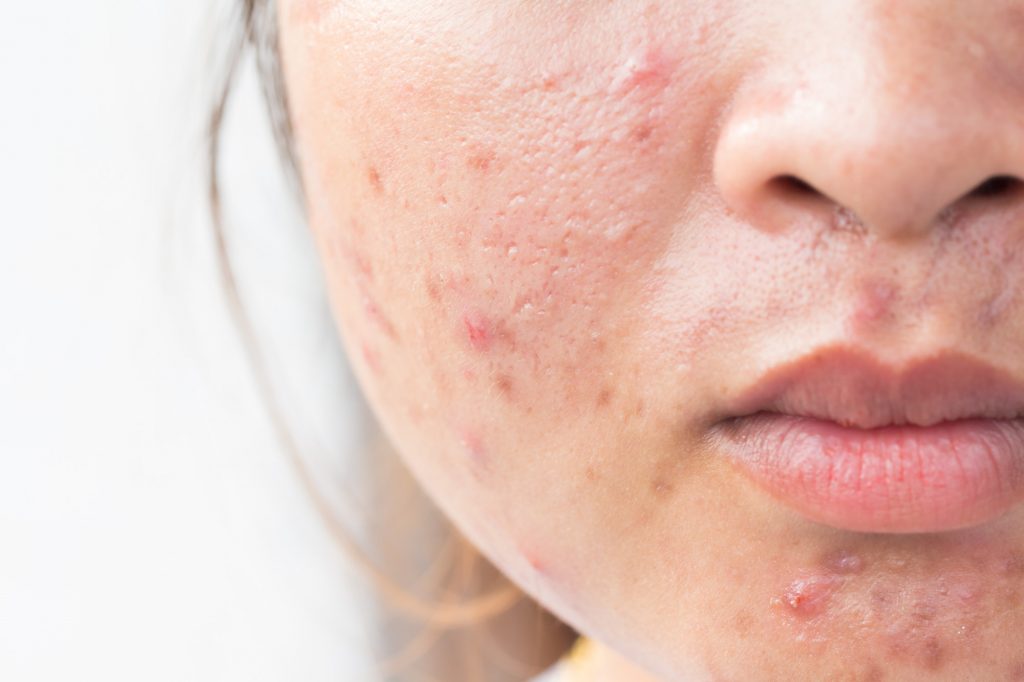Did you know that one out of five people who have suffered from acne develop scars? Getting an acne scar means that the normal tissue of your skin was destroyed and replaced with fibrous tissue.
Many factors contribute to the severity and number of acne scars that you can develop. For example, having a lot of deep and severe acne can lead to more scars. Similarly, pimple popping, long exposure to the sun, and genetics are other factors that can lead to scarring.
Although some scars heal quickly on their own, getting rid of deeper ones might require special treatments. Nowadays, many acne scar solutions can help reduce or mask even the toughest of scars.
So, if you’ve been struggling to get rid of your acne scars, you’ve come to the right place. Keep reading to find out about three solutions for getting smoother, scar-free skin.

1. Laser Treatments
Laser treatments are common for treating all types of scars. For acne scars, lasers usually target the outer layers of the skin to get rid of scar tissue. Simultaneously, the process also helps to develop new, healthy skin cells to replace the damaged tissue.
Laser treatments usually work best on scars that are shallow to medium. However, they can also help reduce the appearance of more severe cases.
Remember, getting rid of, or reducing the appearance of acne scars is not always a “one size fits all,” process. Therefore, asking for advice from a professional is the best way to determine the best treatment for you.
Today, there are several types of laser treatments that have proven to be extremely effective. Here are two options worth exploring:
Kleresca Treatment
The Kleresca treatment is a fantastic option proven to reduce inflammation and the appearance of acne scars.
This laser treatment uses LED-light-based technology to target multiple layers of the skin. Consequently, this treatment helps to not only tackle scars, but also acne itself.
Pearl Fractional Laser
This is a type of ablative fractional laser that helps to break up scar tissue. This treatment helps to remove the damaged tissue and therefore stimulates the production of new collagen.
This is a good treatment to consider if you suffer from severe scarring. Because this is a rather intense treatment, it is important to talk to an experienced professional to determine if it is the right choice for you.
2. Skin Needling
Skin needling, also known as micro-needling or collagen induction therapy is another fantastic option to remove scars. With this treatment, tiny needles are pricked into your skin to help stimulate collagen production. During the procedure, your skin will naturally stimulate the production of collagen as a mechanism for healing the punctures from the needles.
This treatment is commonly used to treat many types of scars including burns and surgical scars. As for acne scars, this treatment works best for those with scars that are not raised.
This scar treatment is a great option if you are looking for a minimally invasive treatment. Although it does a fantastic job of reducing the appearance of damaged skin, the procedure does not remove or permanently alter the outer layer of the skin. Because of that, this treatment works well for people with sensitive skin.
Furthermore, skin needling has been deemed safe for people with darker skin tones.
Skin Needling at CRC
At CRC, the approach to skin needling has been optimized to deliver the best results. The procedure includes using a 2mm needling device and applying topical agents to enhance the overall outcome.
3. Skin Peels
Skin peels are a very popular procedure that helps treat several different skin concerns. Besides helping reduce the appearance of scars, a skin peel can brighten and smooth the skin, unclog pores, and reduce acne.
For this treatment, a chemical solution is applied to the skin to remove old skin from the outermost layers. After the old skin is removed, new, fresh skin replaces it, making it look a lot smoother.
This treatment reduces hyperpigmentation and smooths the skin, therefore helping diminish the appearance of some acne scars.
Some types of acne scars might require several peels to appear smaller. In addition, more severe scars might need other treatments like the ones mentioned above to be effective.
Types of Peels
There are three types of skin peels: light, medium, and deep.
To smooth mild scarring and reduce hyperpigmentation, a light peel might be sufficient. For faster results, a medium peel might be the best option. For acne scars, deep peels are not usually recommended.
Some examples of skin peels used to treat acne scars include glycolic acid peels, lactic acid peels, salicylic acid peels, and TCA peels. As always, it is best to talk to a professional to determine if chemical peels are the best option for you.
At-Home Peels Vs. Professional Peels
Nowadays, there are many at-home skin peel treatments. Although these might help reduce the appearance of scars over time, professional peels offer much faster and effective results.
Ready to Get Rid of Your Acne Scars?
Masking and reducing acne scars is possible. Whether your scars are deep or raised, there are plenty of treatments that you can try to achieve beautiful, scar-free skin.
Laser treatments, skin needling, and skin peels are three fantastic acne scar solutions with incredible outcomes. No matter the severity of your scars, these options are worth exploring to achieve your desired results.
So, what are you waiting for? Book an appointment today and start your journey towards scarless skin!



